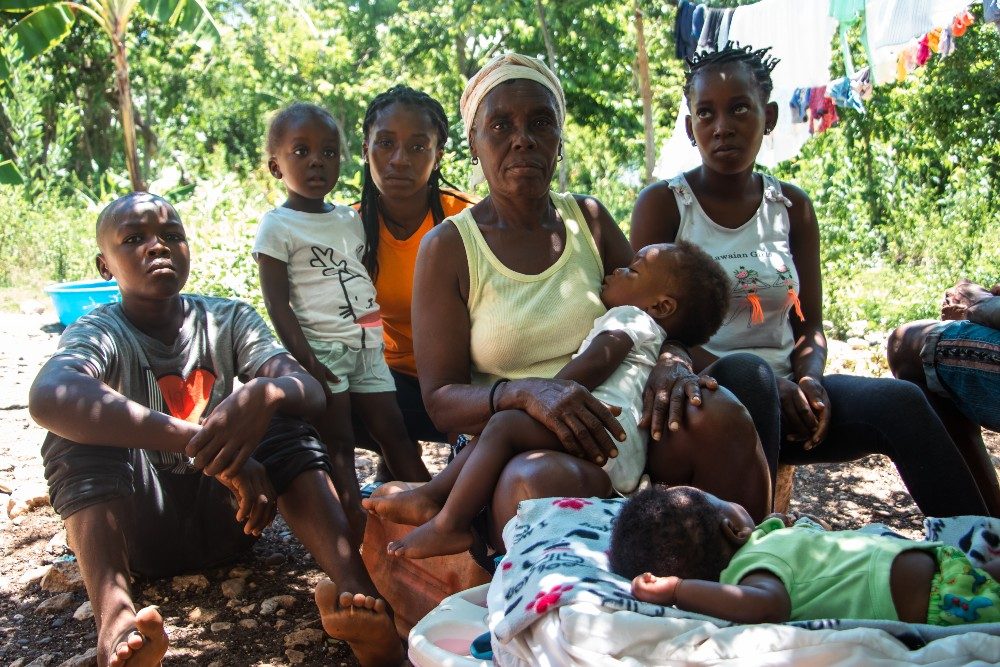Hunger crisis: Concern deepens for women and girls in Haiti
3 November 2022Haiti is one of the hungriest countries on earth and women and girls are bearing the brunt of it says Plan International.

The hunger crisis is having a profound effect on families in Haiti.
Some 4.7 million people are experiencing high levels of acute food insecurity in a crisis driven by political violence and natural disasters in the Carribbean country. According to the latest research from the IPC (Integrated Food Security Phase Classification) 19,000 people are experiencing catastrophic hunger. The UN also says 100,000 children under the age of 5 are severely malnourished in Haiti.
Since July 2022, Plan International has been responding to the hunger crisis in the south-east and the north-east department of Haiti, says Daphne De Bordes, Country Director of Plan International Haiti. But the ongoing violence and fuel shortages in the country have made access difficult.
“Our main concern is focused on women and girls. Not only are we challenged with getting enough funds to provide food and other crucial elements, with the current crisis in the country it is almost impossible to move around. The fuel shortages and daily violence are affecting how and where we can work and urgent supplies are not getting where they should be. In the end it is the women and girls who pay the price,” she says.
Women and girls eat least and last
Women and girls account for 70% of the world’s hungry and often end up eating least and last.
Recent research by Plan International on the impact of the hunger crisis on women and girls in communities in Haiti’s south-east, found evidence of discrimination against them. Including often receiving less food than men and boys. The research shows that on average, women in 87% of households receive a lower food ration than men, compared with 12% of women who receive the most. Girls in 58% of households receive a lower food ration than boys.
It is the women and girls who pay the price.
Daphne De Bordes, Country Director of Plan International Haiti
The hunger crisis has also forced some girls to engage in sexual activities in exchange for food or money. This has directly resulted in numerous cases of unwanted and early pregnancies according to the research.
On top of all these crises, a recent cholera outbreak has hit the country hard. The acute diarrhoeal infection is caused by ingestion of food or water contaminated with bacteria and can kill within hours if left untreated. The last major outbreak in Haiti was in 2010 when nearly 10,000 people died. It’s estimated there are globally 1.3 to 4 million cases and 21,000 to 143,000 deaths each year due to cholera. This year is especially concerning as the World Health Organisation has said there’s a shortage of cholera vaccines due to a rise in global cases.
Support for communities
Plan International is preparing work aligned with the government’s response to the outbreak, which will include the distribution of hygiene kits to communities and raising awareness in communities on preventative measures.
As the hunger crisis also worsens, Plan International says it will continue to provide assistance to women, girls and their families too. An estimated 3.6 million US dollars in funding for more work in Haiti is needed and Plan International is hoping more help comes from the international community before things get any worse.
To date, De Bordes says 776 families have benefited from cash transfers for the purchase of food. The organisation has also been doing awareness sessions on healthy nutrition.
“In the coming weeks, Plan International expects to continue with awareness campaigns and the delivery of essential items to communities. The hope is to reach at least 226, 292 households for the response within our areas of interventions,” says De Bordes.
For more information, case studies or interviews, please contact:
Nina Devries, Deployable Global Press officer: Nina.devries@plan-international.org
Or
Juan Estrella, Regional Humanitarian Response Communication Officer: Juan.Estrella@plan-international.org
Categories: Emergencies


